Session details
Sessions, speakers and program are subject to change without notice.
This page will be updated if changes are made to sessions.
FULL
A1 Literacy and Numeracy in Practice – It works.
Christine Tully, Cindy Davies and Sam Harrison, Melbourne Polytechnic
Room 1
The secret to successful team-teaching will be revealed in this session of experienced teachers who will look at a successful model of providing literacy and numeracy support in VET programs with positive outcomes. They will explore the benefits and some of the challenges of team-teaching. The panel will be made up of a literacy numeracy teacher and two VET teachers, one from electrical trades and the other from community services. They will consider how the model works and what each of them gain from the experience as well as the benefits to students.
Chris Tully has worked in the Adult Education field for 31 years across a range of areas. Over the last 10 years she has worked in the Literacy and Numeracy support area, coordinating literacy and numeracy support to a variety of VET programs. She also has contributed to the Australian Core Skills Framework as an expert commentator. She has been involved in the accreditation and re-accreditation of various curriculum and training packages including the Certificates in General Education for Adults.
Cindy Davies has been an electrical trades teacher and lead teacher at Melbourne Polytechnic for over 18 years. In various levels of education Cindy has worked closely with LN teachers in supporting our students’ learning needs. Cindy has been involved in many changes from delivering paper based assessments to online assessments and the transitions of qualifications. One important factor in her educational journey has been the ever changing needs of learners. Working in collaboration with the classroom support team is always a number one priority.
Sam Harrison has over a decade of experience as a TAFE teacher in the Community Services Department at Melbourne Polytechnic, as well as four years experience as a lecturer in the Faculty of Arts and Education and Deakin University, delivering the Graduate Certificate in AVET program. Sam has a strong interest in learning design and has implemented best practice e-facilitation skills and knowledge to ensure quality student-centric teaching and learning. Sam won the Melbourne Polytechnic Excellence in Teaching (VET) Award in 2022.
A2 Learner voice: Findings from a case study of (mainly) Māori perspectives on learning, literacy and numeracy, and wellbeing
Jane Furness, Gemma Piercy-Cameron, Bridgette Masters-Awatere, Sharyn Heaton and Bill Cochrane, University of Waikato
Room 2
This paper presents findings from a qualitative study that focuses mainly, but not exclusively, on the voices of Māori New Zealanders on perceptions of learning, literacy, numeracy, and wellbeing. The study is part of a wider project ‘The expression, experience and transcendence of low skill in Aotearoa New Zealand’. The larger project explores people’s life patterns and trajectories using PIAAC and large infrastructure data sets with a view to informing future policy.
The qualitative part of the project captures the lived experiences of mainly Māori participants who are either participating in adult literacy and numeracy education or engaged with a social agency supporting better life outcomes for their families. in this session the research team will report on findings from the first of these case studies in which the adults are active literacy and numeracy learners. The findings reveal the continued relevance for Māori of historic expressions of knowing, being and doing and suggest a biliteracy approach is essential for equitable futures for all New Zealanders. This presentation will be of interest to those who work with or for Indigenous peoples in adult literacy and numeracy policy and/or practice.
 Jane Furness has degrees in education and psychology including a PhD from the University of Waikato where she has taught in the Community Psychology programme. Her research interests include the contribution of adult and family literacy to wellbeing, community psychology approaches to social issues and qualitative methodologies.
Jane Furness has degrees in education and psychology including a PhD from the University of Waikato where she has taught in the Community Psychology programme. Her research interests include the contribution of adult and family literacy to wellbeing, community psychology approaches to social issues and qualitative methodologies.
Gemma Piercy-Cameron has a PhD in Labour Studies from the University of Waikato and teaches in sociology and social policy. Her research interests include employment relations and tertiary/adult education and training, the changing nature of work (economy and society), work identities and craft.
Bridgette Masters-Awatere iis the Director of both the Māori and Psychology Research Unit and the Community Psychology programme in the School of Psychology at the University of Waikato. Her research interests include Māori health, Indigenous psychology and evaluation.
Sharyn Heaton is a senior lecturer in Te Kura Toi Tangata School of Education at the University of Waikato. Her doctoral research examined the whare tapa whā (a Māori health model) discourse in educational contexts and how it has shaped perceptions of Māori self.
Bill Cochrane has a PhD in Labour Studies from the University of Waikato and teaches in the Social Policy programme in the School of Social Sciences at the University of Waikato. His main research interests are focused on the labour market and the quantitative analysis of social phenomena.
A3 Analysing a dynamic dialogue: Jobs and Skills Australia’s foundation skills study discussion paper
Dr Don Zoellner, Charles Darwin University
Room 3
Jobs and Skills Australia (JSA) has been given a number of priority tasks including the construction of a national evidence base to do with English language, literacy, numeracy and digital literacy. This paper presents results of a discourse analysis of JSA’s discussion paper expressing the agency’s framing of the issues. The research question seeks to identify what the problem is represented to be. This method also examines some of the silences that are inherent in issues of representation; these are often more revealing than focusing solely on the dialogue the agency prefers. The absence of quantitative measurements of loosely defined concepts such as digital literacy and contested versions of literacy are uncritically linked to poor labour market outcomes for groups of Australian residents. This simple linear relationship requires further investigation in the skills development operating environment where no Jobs and Skills Council was deemed suitable to represent the education industry generally and foundation skills particularly.
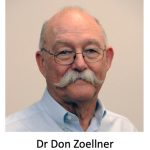 Dr Don Zoellner has worked in the school, vocational and higher education sectors in the Northern Territory since 1973 including senior leadership roles at Centralian College and Charles Darwin University. He was a panel member of the Shergold Review of Senior Secondary Pathways. Dr Zoellner has served on numerous advisory committees, reviews and evaluations of education and training at NT and national levels. He was the board chair of Group Training NT and is the independent chair of the Industry Skills Advisory Council NT board. He was the NT representative on the Australian Industry and Skills Committee and is a member of the National VET Regulator Advisory Council. Dr Zoellner independently researches, presents and publishes on the development and implementation of VET policy.
Dr Don Zoellner has worked in the school, vocational and higher education sectors in the Northern Territory since 1973 including senior leadership roles at Centralian College and Charles Darwin University. He was a panel member of the Shergold Review of Senior Secondary Pathways. Dr Zoellner has served on numerous advisory committees, reviews and evaluations of education and training at NT and national levels. He was the board chair of Group Training NT and is the independent chair of the Industry Skills Advisory Council NT board. He was the NT representative on the Australian Industry and Skills Committee and is a member of the National VET Regulator Advisory Council. Dr Zoellner independently researches, presents and publishes on the development and implementation of VET policy.
B1 Using audio-recordings of text to improve reader fluency
Dr Ann Kelly, QLD Council for Adult Literacy
Room 1
This presentation will expand participants’ teaching strategy repertoires. There is evidence to show that readers’ fluency is improved when they have access to audio-support to text. Such support can be used as a scaffold whereby readers can listen multiple times to a text they want to read, can read along with the text reader and then read it independently.
Through professional sharing and an exploration of teaching and learning methodology and ideas, participants will learn how to scaffold, how to use an audio-support approach and then consider the viability of these activities for their practice. Those with experience in this methodology will have an opportunity to share and discuss their experiences.
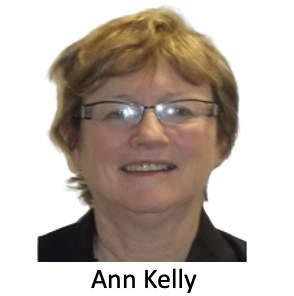 Dr Ann Kelly has worked in the adult literacy and vocational education fields in a range of different roles, her most recent being as a lecturer at Griffith University teaching adult literacy courses and other courses within vocational education undergraduate and master programs. She has also supervised master and doctoral students. Ann is the President of the Queensland Council for Adult Literacy and this Council’s representative on ACAL, of which she is a life member.
Dr Ann Kelly has worked in the adult literacy and vocational education fields in a range of different roles, her most recent being as a lecturer at Griffith University teaching adult literacy courses and other courses within vocational education undergraduate and master programs. She has also supervised master and doctoral students. Ann is the President of the Queensland Council for Adult Literacy and this Council’s representative on ACAL, of which she is a life member.
B2 Barriers and Enablers to Literacy and Numeracy: Insights from the Pacific People in New Zealand
Betty Ofe-Grant, Researcher, AUT University New Zealand
Room 2
Tagata Pasifika or Pacific people in New Zealand are among the most disadvantaged ethnic groups who over-represent the adult working-age population with low literacy and numeracy skills. Individuals with low literacy and numeracy tend to experience higher levels of marginalisation, vulnerability, cycles of poverty and significant risks of poor health and well-being. As part of a five-year mixed method nationwide study led by the New Zealand Work Research Institute, this paper examines the barriers and enablers to transcend low levels of literacy and numeracy for Pacific people living and working in New Zealand.
Utilising qualitative focus group discussions founded on indigenous methods, Teu le va (relational spaces) and Talanoa (storytelling) from 230 Pacific participants, Betty found that multiple barriers exist at the macro (societal), meso (organisational, schools and training institutions) and micro (individual) levels alongside cultural and familial factors that perpetuated and sustained low literacy and numeracy skills. This paper highlights the importance of acting responsibly and sustainably to address the Pacific people’s skills using culturally appropriate and safe methods. This presentation will add to the growing conversation of providing meaningful, culturally sensitive, and actionable policies to improve and enrich the lives of the Pacific people.
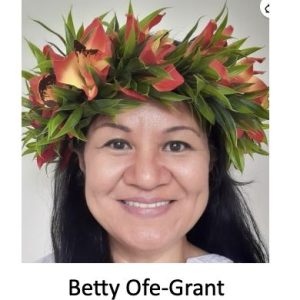 Dr Betty Ofe-Grant is a New Zealand-born Samoan researcher and lecturer from AUT University in New Zealand. She researches Pacific peoples’ issues in labour migration, careers, glass ceilings, diversity, gender, intersectionality, literacy and numeracy and work. She is also the Vice President for the National Council of Women, New Zealand, an organisation established by Kate Sheppard in 1896. Betty is a proud female matai (Samoan chief).
Dr Betty Ofe-Grant is a New Zealand-born Samoan researcher and lecturer from AUT University in New Zealand. She researches Pacific peoples’ issues in labour migration, careers, glass ceilings, diversity, gender, intersectionality, literacy and numeracy and work. She is also the Vice President for the National Council of Women, New Zealand, an organisation established by Kate Sheppard in 1896. Betty is a proud female matai (Samoan chief).
B3 Industry and LLND – Common themes emerging from consultation
Debi Richardson, Industry Innovation Specialist – Foundation and Language Skills, TAFE NSW
Room 3
Industry consultation in the areas of foundation skills has revealed some interesting and challenging trends that will have an impact on the future delivery of training for adults. This presentation will explore the pressures experienced by industry regarding LLND skill gaps and why they are looking to non-traditional training methods as a solution.
We see a lot of information advising that industry is being impacted by gaps in LLND, but what does that look like from the perspective of employers/supervisors and staff on the front line? Following extensive consultation with industry including a survey on the impacts of LLND skill gaps within their respective workforces, this presentation will reveal what industries are being impacted, the scale of the impact and the types of workplace tasks most affected. It will also discuss the confidence of staff and supervisors to discuss LLND needs and industry-preferred training solutions. This presentation will be of interest to those seeking to prepare learners for the expectations of the current workforce and how teaching modes may require some modification to meet those demands.
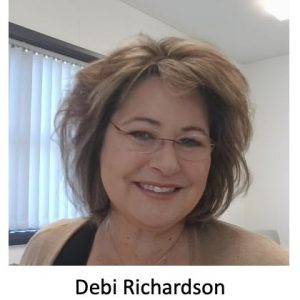 Debi Richardson has been working as the point of contact between Industry and TAFE NSW in the areas of Foundation and Language Skills and Aboriginal Cultural courses for over 6 years. This role is deeply immersed in researching and consulting with Industry on the skill needs and market demands in this area.With over 15 years working in senior and middle management roles, Debi’s industry insights are backed by proven success and applied application in leading and developing diverse teams and building capacity at an individual and community level in a variety of social service settings.
Debi Richardson has been working as the point of contact between Industry and TAFE NSW in the areas of Foundation and Language Skills and Aboriginal Cultural courses for over 6 years. This role is deeply immersed in researching and consulting with Industry on the skill needs and market demands in this area.With over 15 years working in senior and middle management roles, Debi’s industry insights are backed by proven success and applied application in leading and developing diverse teams and building capacity at an individual and community level in a variety of social service settings.
C1 Impactful, Intentional and Irrepressibly Okay
Lindee Conway
Room 1
Teachers are often rushed and chronically time-poor, but this is not because they aren’t working hard to make the best possible lessons and learning for their students! This workshop will focus on a few ideas for repeatable, impactful activities. They will include ‘My own Question Bank’, ‘Multiple Exposures in and out of Class’, and ‘Learning in Class, on the Walls, and before the next session’. This workshop will be positive and respectful of teachers’ commitment to good practice. It will be practical and fun!
 Lindee Conway loves the ACAL conferences, for their energy, keynotes, and the chance to listen and learn from other educators. She’s endlessly curious about ‘what works’ in LLN classes. She is, also, grateful, and humble, about being able to do this work. In the last five years, she has been a teacher Coach and Mentor to Higher Education, VET and Foundation educators. Her workshop will start on time; it won’t go over time and you’ll get some time-savers to use.
Lindee Conway loves the ACAL conferences, for their energy, keynotes, and the chance to listen and learn from other educators. She’s endlessly curious about ‘what works’ in LLN classes. She is, also, grateful, and humble, about being able to do this work. In the last five years, she has been a teacher Coach and Mentor to Higher Education, VET and Foundation educators. Her workshop will start on time; it won’t go over time and you’ll get some time-savers to use.
C2 Digital Disengagement: Making a Choice
Debra Urquhart
Room 2
Technology use and digital literacy are important, intertwined capabilities for participation in life and learning in today’s western world. Many young people still, however, experience digital exclusion resulting from an inability to develop these skills due to lack of accessibility and affordability – the digital divide still exists. Nonetheless, there are young people who have access to computers and the internet but for several reasons have no interest in developing technological competence and digital literacy skills for educational use or for wider use other than personal needs.
Drawing on case study research into early school leavers who re-engaged post-school in distance education, this paper examines in what ways a specific literacy program facilitated enhancement of these learners’ digital literacy practices. The research findings demonstrated a disparity between learner access to digital tools, and their reticence to engage in online learning. Findings also demonstrated teacher reticence to encourage technological and digital literacy capabilities in young people who may still require further development in their reading and writing practices. The research argues that without encouragement and an expansion of multi-literacy capabilities, their enrolment becomes a missed learning opportunity. As a result, a young person’s digital disengagement is perpetuated impacting on their future learning and work needs. This presentation will be of interest to those working online, with young people, or in the area of digital literacy.
 Debra Urquhart is currently undertaking a PhD researching the experiences and outcomes of early school leavers who re-engaged post-school in distance education. Her interest in this research arose from the quandary that the requirements of distance education may provide more challenges than opportunities for early school leavers, even though they may have no other option but to learn this way.Debra has extensive experience in teaching and managing educational programs in the field of language and literacy across several education sectors. During her various roles, she has worked in both face-to-face and distance education. Her most recent role has been teaching academic literacy.
Debra Urquhart is currently undertaking a PhD researching the experiences and outcomes of early school leavers who re-engaged post-school in distance education. Her interest in this research arose from the quandary that the requirements of distance education may provide more challenges than opportunities for early school leavers, even though they may have no other option but to learn this way.Debra has extensive experience in teaching and managing educational programs in the field of language and literacy across several education sectors. During her various roles, she has worked in both face-to-face and distance education. Her most recent role has been teaching academic literacy.
C3 Sludge busting. Using behavioural science to create accessible government services: the NSW Government method and impact
Alex Galassi, Senior Behavioural Advisor, NSW Behavioural Insights Unit, Department of Customer Service, NSW Government
Room 3
Did you know there’s a Government department who are known as the Sludge Busters? Governments have the responsibility to provide equitable services to all the citizens it serves, which includes those with unmet literacy needs. However, government forms, websites and letters are rarely written in plain language and often contain jargon, which makes it difficult or impossible for many citizens to access the services they need. To uphold their responsibility, governments need to meet citizens’ needs. This means identifying barriers to understanding and addressing these, as well as upskilling their staff to do the same.
The NSW Behavioural Insights Unit (BIU) has developed a comprehensive program and tools to meet this need. Their sludge audit method is a diagnostic tool to assess barriers to access across common government channels. The BIU has also developed a series of guides for making services accessible. These tools have led to service improvements by reducing customer effort and allowing more citizens to access vital government services. This presentation will explore the impact of plain language and sludge busting!
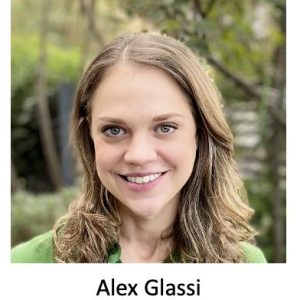 Alex Galassi is a Senior Behavioural Advisor in the NSW Behavioural Insights Unit. She has driven projects to improve customer outcomes and create accessible services through the application of behavioural science. Alex has worked closely with agencies from across NSW Government in a range of policy areas to quantify, identify and reduce unnecessary frictions for customers. She holds qualifications in Rehabilitation Counselling and Psychology and is passionate about shaping and delivering equitable services.
Alex Galassi is a Senior Behavioural Advisor in the NSW Behavioural Insights Unit. She has driven projects to improve customer outcomes and create accessible services through the application of behavioural science. Alex has worked closely with agencies from across NSW Government in a range of policy areas to quantify, identify and reduce unnecessary frictions for customers. She holds qualifications in Rehabilitation Counselling and Psychology and is passionate about shaping and delivering equitable services.
D1 Difficult Conversations about Student Progress – practical tips and scripts
Jane Goodfellow, Principal Lecturer – Education Portfolio, North Metropolitan TAFE, Western Australia
Room 1
In this practical presentation, Jane will present her (nearly) fool-proof ‘script’ for how to handle these conversations, which often arise when a learner isn’t progressing satisfactorily. The idea behind this approach is that we need to be much more intentional about the advice and guidance conversations we have with students, to be fair, transparent, equitable and ethical. Increasing numbers of adult education learners present with conditions such as ADHD and autism, which have significant implications for the ways in which we communicate and guide them, to help them get the best outcome. This workshop will provide a framework and guidelines for how to improve practice in this important space.
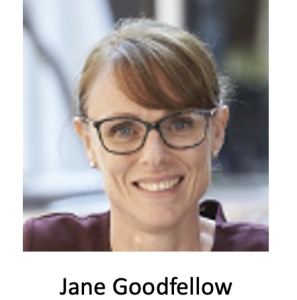 Jane Goodfellow has been both a school teacher (disability) and VET trainer for over two decades and says her passion for teaching has not lessened over the years – if anything Jane is even more enthusiastic about providing students the best learning experience possible. After winning the Australian Trainer/VET Teacher of the Year award in 2017 Jane started sharing her knowledge and experiences with other trainers and has presented at various conferences and RTO professional development days around the country.
Jane Goodfellow has been both a school teacher (disability) and VET trainer for over two decades and says her passion for teaching has not lessened over the years – if anything Jane is even more enthusiastic about providing students the best learning experience possible. After winning the Australian Trainer/VET Teacher of the Year award in 2017 Jane started sharing her knowledge and experiences with other trainers and has presented at various conferences and RTO professional development days around the country.
D2 Teaching digital literacies in adult EAL settings: affordances of AMEP Digital Literacies Framework and Guide
Dr Katrina Tour, Senior Lecturer, Monash University; Mary Wallace, Director, LWA
Room 2
The importance of digital literacies for adult language learners from migrant and refugee backgrounds has been widely recognised in policy documents and research literature. However, there is limited conceptual and practical guidance on how digital literacies can be taught in this context. The research reported in this presentation was designed to address this issue. Bringing together several bodies of scholarly work, a resource called AMEP Digital Literacies Framework and Guide was developed and then used by five teachers in two adult EAL settings in Victoria.
This presentation introduces the resource and then explores how it was taken up by the research participants in their teaching practices. The research findings suggest that the teachers found the framework and guide helpful for teaching digital literacies and were able to use the resource to create many rich learning opportunities for their learners. Showcasing several examples of successful teaching practices, the presentation illustrates both conceptual and practical relevance of AMEP Digital Literacies Framework and Guide for the field and concludes by discussing implications for practitioners, policy-makers and professional learning bodies.
 Dr Katrina Tour is a Senior Lecturer in the Faculty of Education at Monash University. Her research focuses on digital literacies of adults from refugee and migrant backgrounds in life, learning and employment. Katrina provided expert advice to the Australian government regarding digital literacies in the EAL curriculum in schools and Adult Migrant English Program.
Dr Katrina Tour is a Senior Lecturer in the Faculty of Education at Monash University. Her research focuses on digital literacies of adults from refugee and migrant backgrounds in life, learning and employment. Katrina provided expert advice to the Australian government regarding digital literacies in the EAL curriculum in schools and Adult Migrant English Program.
Mary Wallace is the Director of LWA, working with the Department of Home Affairs and Service Providers to support best practice in AMEP delivery. She enjoys conducting research at a national level, designing and facilitating professional learning nationwide and developing resources for publication. Mary has extensive teaching experience overseas and in Australia, teaching in community, workplace and tertiary settings.
D3 Community engagement, relationships and adult educators
Kate Hosking, Freelance; Paddie Lane, Community Greening Education Officer, Royal Botanic Gardens, Greater Sydney
Room 3
In 2020, two adult educators serendipitously met up in a far west NSW town. One educator, a recently qualified LLN facilitator, lives in the community, voluntarily supporting and advocating for people around accessing government agencies: BDM, Centrelink, NDIS, Aged Care, DCJ et al. (survival literacy). The second, an outreach educator within a government agency, runs short courses across NSW on developing skills for growing food, and developing local food security programs (survival-based learning). The years following have seen both educators share a journey which has allowed for regular, rigorous feedback, a sharing of knowledge, books and ideas and most importantly, a connection.
This paper explores this relationship, where each character provides a critical lens, relentlessly questioning approaches and attempting to unlearn western conventions. Re- engaging an educationally damaged and suspicious community and co- designing (with community) sustainable learning pathways and learning environments that are culturally safe, appropriate, relevant, and useful.
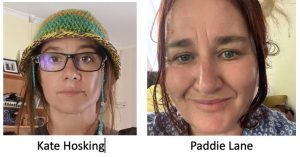 Kate Hosking moved to a far west NSW town as a high school teacher in 2019. Four years later Kate is now a qualified adult educator, having completed her graduate diploma online. With a background in theatre, activism, music, and book narration, Kate is now an adult educator in her remote community. The barriers to adult education are large and real, for educators and learners alike.
Kate Hosking moved to a far west NSW town as a high school teacher in 2019. Four years later Kate is now a qualified adult educator, having completed her graduate diploma online. With a background in theatre, activism, music, and book narration, Kate is now an adult educator in her remote community. The barriers to adult education are large and real, for educators and learners alike.
Since 2004 Paddie Lane has been working in the sustainable education sector. With a focus on experiential learning she blends skills from a Creative Arts degree and a Masters in Adult Education, to design and deliver environmental education programs, for TAFENSW, Wollongong University. In 2018 she joined the community Greening Team at the Royal Botanic Gardens Sydney delivering 26 Master Garden programs to urban, regional, and remote NSW.
P1 Pathways to Health Studies
Susie Sergeant, TAFESA
Room 1
How do we set students on a pathway for success into the health sector? Pathways to Health Studies is an innovative 16 week program which prepares students to enter health related studies at Certificate 3, 4 and Diploma level. The delivery of the Foundation Skills Training Package is contextualised and mapped to the health units of competency. Students speak highly of this course and how it has set them up for success. Many have increased their ACSF levels by 2 points in 16 weeks!
Why does it work? This presentation will unlock the three keys to success: The innovative delivery of the Foundation Skills Training Package in a vocational context, collaboration between the FSK and health lecturers, and continuous adaptation to meet the need of the students.
Susie Sergeant is an experienced lecturer in the foundation skills area. She began teaching in high schools in 1975 and has worked for TAFE over 20 years in a variety of courses. She believes that being student focused is at the heart of success as an educator. For her, the 3 Rs stand for ‘relationship, relationship, relationship’!
P2 Rethinking Aboriginal Pathways: The hidden . … and not so hidden, literacy challenges inherent in creating career pathways for Aboriginal people
Aunty Pam Touma, Head Teacher, Aboriginal Pathways Programs and Adam Nobilia, Eora Centre, TAFE NSW Sydney Region.
Room 2
More and more we have industry and community organisations generating Reconciliation Action Plans with new passion for designing Aboriginal Employment strategies and pathways. While this is a positive step in ‘closing the gap’, there are historical literacy and numeracy gaps that create significant challenges for Aboriginal program designers and teachers, exacerbated by the unique challenges Aboriginal and Torres Strait students face in accessing and completing programs.
Aunty Pam and Adam will consider How can we pave career pathways for Aboriginal People if organisations can’t see the impacts of literacy and numeracy demands in their jobs? And, How do we as teachers develop programs that address the collective needs of Aboriginal learners, while maintaining a person-centred approach?
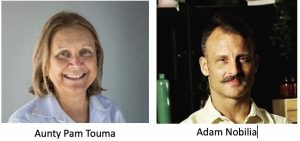 Aunty Pam Touma is a proud Euahlayi woman from Goodooga NSW and is now Head Teacher of Aboriginal Pathways Programs at Eora Centre – TAFE NSW Sydney Region. Her own experience around literacy and numeracy was hard and became more evident and challenging when she became a mature adult learner at TAFE over 15 years ago. She went on to gain an array of qualifications but her own learning experience, coupled with her observation of the challenges facing other Aboriginal community members has made her passionate about creating an impact for Aboriginal people via education – especially around literacy and numeracy programs. As a result, she completed a post graduate Literacy and Numeracy Teaching qualification, providing her with a unique and valuable teaching profile that combines Aboriginal Cultural Studies and Adult Literacy. With this diversity of qualifications and complementary skills, she has gone on to establish both community literacy and industry programs. She is in high demand from organisations seeking partnerships to develop cultural awareness and pathway programs, all motivated by developing Reconciliation Action Plans (RAP) and associated programs as a positive to support the ‘closing the gap’ initiative.
Aunty Pam Touma is a proud Euahlayi woman from Goodooga NSW and is now Head Teacher of Aboriginal Pathways Programs at Eora Centre – TAFE NSW Sydney Region. Her own experience around literacy and numeracy was hard and became more evident and challenging when she became a mature adult learner at TAFE over 15 years ago. She went on to gain an array of qualifications but her own learning experience, coupled with her observation of the challenges facing other Aboriginal community members has made her passionate about creating an impact for Aboriginal people via education – especially around literacy and numeracy programs. As a result, she completed a post graduate Literacy and Numeracy Teaching qualification, providing her with a unique and valuable teaching profile that combines Aboriginal Cultural Studies and Adult Literacy. With this diversity of qualifications and complementary skills, she has gone on to establish both community literacy and industry programs. She is in high demand from organisations seeking partnerships to develop cultural awareness and pathway programs, all motivated by developing Reconciliation Action Plans (RAP) and associated programs as a positive to support the ‘closing the gap’ initiative.
While Adam Nobilia is best known for his teaching role on the SBS Documentary, ‘Lost for Words’, he has spent the majority of his career teaching trauma-informed educational programs to vulnerable students in correctional centres. Adam currently teaches on the IPROWD program at EORA TAFE in Redfern. The program was designed to prepare young Aboriginal and Torres Strait Islander students for a career with the NSW or Federal Police force and embeds literacy, numeracy and communication skills into every aspect of its design. In addition to his work as a teacher, Adam has combined his qualifications in Adult Education, Counselling and Behaviour Analysis to facilitate psycho-education programs for parolees whose offences include domestic and family violence, drink driving and misuse of drugs and alcohol.
FULL
Q1 Respect, affect, and connect
John Blake, Director of Online Learning, Eastern College Australia
Room 1
Hands up those who want students to thrive, not just survive!
This workshop will explore easily contextualised tools and strategies that you can use or adapt in your classes to grow your teachers’ toolbox and support the development of your students. You will be introduced to proven activities and ideas that cultivate connections with learners, a fundamentally important need in their progress of language, and meta-language acquisition. Combining practical activities and underpinning theories, ideas in this half hour of (literacy) power have been successful with adult learners in Australian and international contexts amongst language schools, VET cohorts, prisons, industry groups, worksites, colleges, and in universities.
Incorporating 21st Century skills with teacher creativity, these concepts will support language acquisition, span generations, and assist with neuro-diverse learning. This workshop will set you up to make a real difference in your students’ lives: put these practical proposals into practice when you return from the conference, and watch your learners flourish!
 Spanning 30+ years, across 20+ countries, John Blake has written, contributed, and delivered resources and training programs across the globe in English as Additional Language (EAL) colleges, Hospitality, Foundation Skills, and educational delivery in schools, universities, TAFEs, RTOs, prisons, mining sites, and resorts. John is passionate and strives to enrich teachers and trainers to connect learners to lifelong learning. As a teacher (M. Ed. in Literacy Education) and content writer, John currently serves at Eastern College as Director of Online Learning while remaining involved in teacher education throughout Australia and overseas.
Spanning 30+ years, across 20+ countries, John Blake has written, contributed, and delivered resources and training programs across the globe in English as Additional Language (EAL) colleges, Hospitality, Foundation Skills, and educational delivery in schools, universities, TAFEs, RTOs, prisons, mining sites, and resorts. John is passionate and strives to enrich teachers and trainers to connect learners to lifelong learning. As a teacher (M. Ed. in Literacy Education) and content writer, John currently serves at Eastern College as Director of Online Learning while remaining involved in teacher education throughout Australia and overseas.
Q2 The 12 Pillars of successful program design for Anangu LLN&D learners in APY Lands SA
Michael O’Hara, Accomplished Lecturer, TAFESA, Alexis Apfelbaum, Accomplished Lecturer, TAFESA,
Room 2
This workshop will explore the influence of culture and society on the selection of pedagogy and teaching practices being used in Anangu communities of the APY Lands, South Australia. Expanding on key concepts using a series of challenging focus questions and discussion points, Alexis and Michael will compare and highlight differences in the teaching practices used in city-based training and those they are using in the Lands.
Pedagogy and practice in First Nations Australia change constantly due to the shifting requirements of Government priorities, workplace needs and community expectations. Governments change; policy makers move on; and educators on the ground retire, burnout or even run away. From their experience of training, Alexis and Michael have found that the LLN gap between the APY Lands and city learners is incomparable. They found a different approach was needed in training and workforce development to meet the needs of employers and Anangu within a changing Australia.
This presentation will include 12 pillars for program design for Anangu learners; Pedagogies drawn on in the training; the differences in LLN&D content and expectations between city and community learner cohorts; and suggestions for trainers in First Nations Communities.
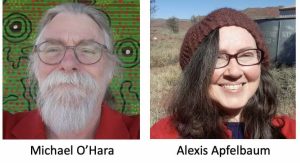 Michael O’Hara is a TAFESA Accomplished Lecturer working in the remote community of Amata, APY Lands, SA. He provides workplace focused Foundation Skills programs for RASAC Municipal Services (MUNS) workers, Community Development Program (CDP) participants and Community Patrol workers as well as being a resource and advocate for community members. Earlier, Michael was the CEO of Karrayili Adult Education in Fitzroy Crossing, WA. He began living and working in communities in 2014 at Yuendumu, NT.
Michael O’Hara is a TAFESA Accomplished Lecturer working in the remote community of Amata, APY Lands, SA. He provides workplace focused Foundation Skills programs for RASAC Municipal Services (MUNS) workers, Community Development Program (CDP) participants and Community Patrol workers as well as being a resource and advocate for community members. Earlier, Michael was the CEO of Karrayili Adult Education in Fitzroy Crossing, WA. He began living and working in communities in 2014 at Yuendumu, NT.
Alexis Apfelbaum is a TAFESA Accomplished Lecturer working in the remote community of Pukatja, APY Lands in SA. She has worked extensively with disadvantaged communities and has taught Foundation Skills and accredited LLN courses to First Nations adult learners in Yuendumu, NT and Fitzroy Crossing, WA. She has also worked in various service positions in the APY Lands, Fitzroy Crossing and Yuendumu and has developed close networks with First Nations people in those communities.
R1 Dyslexia and other Specific Learning Disorders
Karen Dymke, Director, Thoughtful Works
Room 1
Dyslexia affects up to 10 – 20 percent of the population world-wide. How many are there in adult and VET classes?! In this presentation Karen will explain what dyslexia is, and the different skills that are impacted by dyslexia. You will learn the red flags for dyslexia.and what you as an educator can do to help support your students reading, spelling and writing skills. We will also look at a range of other Specific Learning Disorders and how you can support and accommodate your students to achieve their full potential.
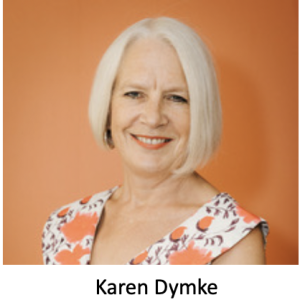 As a teacher educator, presenter, senior leader, project manager, instructional coach and teacher, Karen Dymke’s role in education has seen her work across a range of sectors to bring a unique breadth of knowledge, balance and expertise to education and her consultancy. Karen has over 30 years experience in the educational sector, including TAFE and the Adult Community sector. Karen has a particular interest in literacy, engaging learners and progressing disadvantaged learners.
As a teacher educator, presenter, senior leader, project manager, instructional coach and teacher, Karen Dymke’s role in education has seen her work across a range of sectors to bring a unique breadth of knowledge, balance and expertise to education and her consultancy. Karen has over 30 years experience in the educational sector, including TAFE and the Adult Community sector. Karen has a particular interest in literacy, engaging learners and progressing disadvantaged learners.
R2 Pathways to Digital Success – enabling student digital inclusion in the Skills for Education and Employment (SEE) Program
Georgie Cole, Teaching and Learning Curriculum Lead and Michael Hill, Learning Designer, Navitas Skilled Futures
Room 2
Are you interested in learning about the process of designing classroom materials to improve students’ digital literacy skills?
Channels of communication, and the ways our students transact, work, study and navigate their world are increasingly mediated by digital technology. However, to enable digital inclusion, online privacy and financial safety, students need time and space to explore, experiment, and reinforce their digital skills. The presenters will showcase a set of modules developed through a SEE Innovative Funding Project to build the digital capabilities of students at ACSF PLB level and above. Topics covered include using digital devices, digital communication, social media, maps, security and financial literacy.
Guided by Merrill’s (2002) Instructional Design Principles, the modules tap into students’ existing digital knowledge, and engage them with authentic scenarios where they problem-solve, apply new understandings to their own digital practices, and create real outputs. Via the workbooks and links to various digital apps, services and platforms, students can develop their digital vocabulary, sign/symbol and text literacy. The resources were piloted with SEE classes, and the speakers will present key findings from observation and survey feedback which can inform development of similar content in the future.
Georgie Cole has been working in adult language and literacy since 1987, in variety of contexts – AMEP, SEE, Foundation Skills for Your Future, adult community education, literacy and numeracy support, academic programs, and ELICOS. She is the Teaching and Learning Curriculum Lead at Navitas Skilled Futures, Sydney and is on the Executive Committee of the NSW Adult Literacy and Numeracy Council.
Michael Hill has been working in language and literacy education for over 20 years, both in Australia and internationally. As a teacher / trainer and learning designer Michael has participated in the creation of numerous resources and programs which seek to incorporate digital skill development within language and literacy classrooms. Most recently, he led the development and piloting of a suite of digital resources as part of a SEE Innovation Project
R3 Supporting dynamic dialogues: LLND resources in VOCEDplus
Rose-Anne Polvere, Research Librarian, National Centre for Vocational Education Research
Room 3
VOCEDplus is your key to currency! Its a free international database and provides a platform for sharing authoritative, current (and older, well respected) information on many aspects of adult literacy policy, practice, research, and theory. VOCEDplus also provides access to practical resources that support teaching and learning practice and assessment. As ACAL celebrates 45 years of active promotion in the field of adult literacy and numeracy, this session will resonate with all six conference strands, highlighting the value of VOCEDplus in supporting the discussion of key issues in the field and encouraging reflection on both policy and practice.
Participants will experience the new-look VOCEDplus through several brief demonstrations of the content and collections, both current and archival, designed to support the broader community of LLND researchers, teachers, practitioners and planners in their work. Participants will be encouraged to suggest ways to further expand the LLND collections in VOCEDplus.
 Rose-Anne Polvere is a Research Librarian with the Knowledge Management Branch at NCVER. She manages the content-related tasks of the VOCEDplus database and website and provides reference, research and information services for internal and external clients. Knowledge and expertise of information sources in the tertiary sector have been developed over more than 15 years as an information specialist with NCVER and over 20 years’ experience in the fields of information management and education. Rose-Anne has post-graduate qualifications in both education and library/information studies. ACAL members will know Rose-Anne from her frequent contributions to the ACAL newsletter, which help us maintain currency and keep up-to-date with research.
Rose-Anne Polvere is a Research Librarian with the Knowledge Management Branch at NCVER. She manages the content-related tasks of the VOCEDplus database and website and provides reference, research and information services for internal and external clients. Knowledge and expertise of information sources in the tertiary sector have been developed over more than 15 years as an information specialist with NCVER and over 20 years’ experience in the fields of information management and education. Rose-Anne has post-graduate qualifications in both education and library/information studies. ACAL members will know Rose-Anne from her frequent contributions to the ACAL newsletter, which help us maintain currency and keep up-to-date with research.
S1 Engaging learners successfully with the world of numeracy and maths
Dave Tout, Senior Reseach Fellow, Numeracy and Mathematics, Australian Council for Educational Research (ACER) and Multifangled P/L
Room 1
Connecting and engaging positively and dynamically with our adult numeracy learners is critical. This hands-on workshop will enable participants to experience a range of maths activities suitable for classroom use with a range of EAL, literacy and numeracy students. The activities focus on the development of core maths skills at lower ACSF levels through approaches such as whole and small group work and the use of hands-on materials – and on having some fun! The maths content will focus on areas such as number, measurement, statistics and data and the activities will illustrate alternative approaches to the traditional worksheet or textbook approach for teaching numeracy and maths.
 Dave Tout is an experienced adult and youth LLN educator who is particularly interested in making mathematics relevant, interesting and fun for all students, and is recognised as one of Australia’s leading numeracy personnel with over 50 years’ experience working across schools, TAFEs, community providers, universities, national education bodies and workplaces. He has worked at a state, national and international level in research, curriculum, assessment and professional development. Dave has written many numeracy and maths curriculum, teaching and PD resources, and is also an author of the Australian Core Skills Framework. Dave has been involved in international numeracy assessments including the OECD’s PIAAC and PISA assessment programs.
Dave Tout is an experienced adult and youth LLN educator who is particularly interested in making mathematics relevant, interesting and fun for all students, and is recognised as one of Australia’s leading numeracy personnel with over 50 years’ experience working across schools, TAFEs, community providers, universities, national education bodies and workplaces. He has worked at a state, national and international level in research, curriculum, assessment and professional development. Dave has written many numeracy and maths curriculum, teaching and PD resources, and is also an author of the Australian Core Skills Framework. Dave has been involved in international numeracy assessments including the OECD’s PIAAC and PISA assessment programs.
S2 Volunteer Literacy Tutor – how, what, why.
Linno Rhodes, Coordinator, Yarraville Community Centre; Lizzie James, Regional Literacy Officer at Your Library, Eastern Regional Libraries, Victoria
Room 2
Setting up and running a Volunteer Literacy Tutor Training Program involves developing and delivering a tutor training course to interested volunteers, finding adults with literacy challenges who would like to participate, and coordinating the program. Importantly, it also involves knowing your local community and creating a space that meets local needs and engages with local agencies and organisations.
Linno and Lizzie have successfully done just that! This workshop will outline the how, what and why of volunteer tutoring. Participants will have access to a free copy of training material and practical ideas of how to set up and run a volunteer tutor training program.
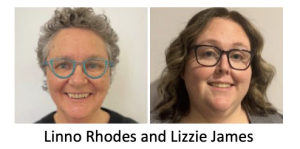 Linno Rhodes is the pre-accredited course coordinator at Yarraville Community Centre, a Learn Local in Melbourne’s inner west. She developed a training course for volunteers wanting to work with adults seeking support with their literacy. Linno enjoys working in adult community education and is especially passionate about adult literacy and trauma aware teaching.
Linno Rhodes is the pre-accredited course coordinator at Yarraville Community Centre, a Learn Local in Melbourne’s inner west. She developed a training course for volunteers wanting to work with adults seeking support with their literacy. Linno enjoys working in adult community education and is especially passionate about adult literacy and trauma aware teaching.
Lizzie James is the Regional Literacy Officer at Your Library – a public library corporation providing public library services across 3 municipalities in the outer eastern suburbs of Melbourne. She develops and runs a variety of literacy programs, working closely with neighbourhood houses, local council and other organisations to engage and support the diverse communities the library serves. In 2022 Lizzie established a volunteer literacy tutoring program in partnership with a neighbourhood house, providing 1:1 literacy tutoring after extensive research on the best practices of programs both in Australia and overseas.
S3 Engagement of young, ‘at risk’ students in pre-vocational learning. A tried and tested approach from one TAFE campus in Regional NSW
Susan Withnall, LLN Teacher, TAFE NSW
Room 3
This approach to working with 15 and 16 year old students who bring negative education experiences and ways of interacting with them to their new adult learning context has been developed and refined over more than 15 years. On arrival the young people lack independent learning skills, don’t have acceptable social skills for learning in a group situation, and have a wide variety of LLND skills. Drawing on adult learning principles, Susan has found that what works is a combination of connection and respect, clear boundaries with responsibilities, a safe learning environment and creating a place to ‘take risks’, freedom to move at their own pace and in their own learning style (within the boundaries of the course timeline), and having learning contextualised to their own experiences. She will also share a range of other strategies, underpinned by three elements: Support / Support/ Support for students; Preparation / Preparation / Preparation for teachers; and Patience/ Patience/ Patience for all.
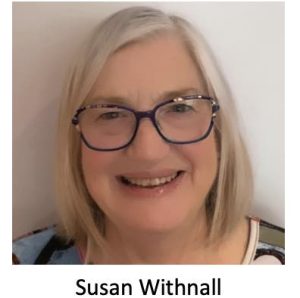 Susan Withnall originally worked as a high school teacher while also beginning to teach in Adult Basic Education in the evenings in Sydney in 1986.After moving to Regional NSW she began some casual teaching in General Education at Taree TAFE. She now teaches CPALES Career Pathways, Education and Aboriginal Languages. During this time, she has taught Literacy, English, Digital skills and some Numeracy across courses from NNR up to Certificate 4 level, along with many hours of vocational team teaching and tutorial sessions.
Susan Withnall originally worked as a high school teacher while also beginning to teach in Adult Basic Education in the evenings in Sydney in 1986.After moving to Regional NSW she began some casual teaching in General Education at Taree TAFE. She now teaches CPALES Career Pathways, Education and Aboriginal Languages. During this time, she has taught Literacy, English, Digital skills and some Numeracy across courses from NNR up to Certificate 4 level, along with many hours of vocational team teaching and tutorial sessions.
T1 Engagement of apprentices in the construction industry in the online environment
Janet McHardy, Literacy Champion, Te Pūkenga-BCITO, Aotearoa New Zealand
Room 1
Digital technologies have revolutionized the way we receive and use information. A recent study suggests around 20% of the adult population in Aotearoa New Zealand may have below essential digital skills and lack the skills necessary to operate effectively in the digital space. Digital literacy, underpinning digital skill, does not exist in a vacuum and interacts with general literacy. Some studies suggest as many as 1.3 million of Aotearoa New Zealand adults live with low literacy skills. Without a sufficient level of literacy adults are unlikely to fully met the challenges in acquiring the digital skills necessary to successfully deal with the modern digital world.
Work based training in Aotearoa New Zealand, in common with training and learning systems world wide, has introduced online methods. This presentation discusses findings and implications of a recent study of the online engagement experiences of a group of apprentices in the construction industry that suggest learning challenges including less-skilled reading may be barriers to full participation in the online space. Recommendations for enhancing the experiences of apprentices include targeted, embedded literacy support, ensuring appropriate devices are available and continuation of paper-based resources in some contexts.
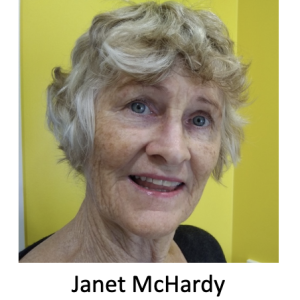 Janet McHardy is an experienced literacy practitioner having worked in various contexts in both Australia and Aotearoa New Zealand over many years. Although a generalist in her practice, much of Janet’s research has been around less-skilled readers and how best to build reading skills. She currently works in the work based learning environment and is focused on how to support and enhance the learning journey of apprentices. Recent research is focused on the experiences of apprentices with technology enabled training and learning, and ways to overcome barriers for apprentices in this space.
Janet McHardy is an experienced literacy practitioner having worked in various contexts in both Australia and Aotearoa New Zealand over many years. Although a generalist in her practice, much of Janet’s research has been around less-skilled readers and how best to build reading skills. She currently works in the work based learning environment and is focused on how to support and enhance the learning journey of apprentices. Recent research is focused on the experiences of apprentices with technology enabled training and learning, and ways to overcome barriers for apprentices in this space.
T2 Paolo Freire: how relevant is he now?
Anne Kiley, Charles Sturt University
Room 2
Paolo Freire (1921-1997) was a Brazilian thinker and writer who has long been seen by many in adult literacy and numeracy as a pin up boy for the adult basic education movement. Freire is known for his revolutionary ideas on education. Come and find out if he has influenced your practice. This presentation will be an exploration of Freire’s philosophy and methodologies, and their relevance to adult basic education approaches and provision. It will consider Freire’s ongoing importance, and his impact on current practice.
After recently meeting up with some old adult literacy friends I realised that the direct link to Freire may currently be faint to invisible. I guess I hail right back to the early days of ACAL with what Bob Boughton would call its “social justice orientation” – perhaps best described as “Social democratic Fabianism”, based on Freire’s ideas. So, in giving my paper, I won’t make any assumptions about attendee’s knowledge, instead giving anyone who cares to come and listen a run down on what Freire offered/offers adult literacy, followed by some Freirean tenets of ABE practice (eg student centered, student led, themes emanating from students’ experiences, mutual respect, critical approach. etc) followed by questions to the attendees on how/or if Freire resonates with them and their practice.
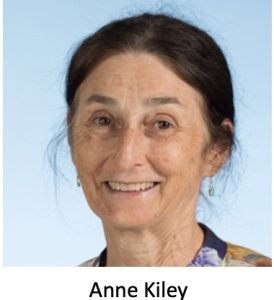 Anne Kiley has worked in the adult literacy/numeracy field within the VET sector for many years, and has been an ACAL member for longer than she wants to admit.
Anne Kiley has worked in the adult literacy/numeracy field within the VET sector for many years, and has been an ACAL member for longer than she wants to admit.
For the past decade Anne has taught in the higher education sector, mostly online delivery for Charles Sturt University.
She was first introduced to the ideas of Paolo Freire in the late 1970s.
T3 Literacy is everyone’s business
Lyn Wilson, Team Leader Literacy: TAFE NSW Sydney Region; Gemma Beall, Team Leader Literacy, TAFE NSW Sydney Region
Room 3
Adult Literacy Teachers, attracted to the profession in the 1980s and 1990s when adult literacy was a key focus for governments and policy makers, are now finishing up in the workforce.What are the impacts? How can we renew this profession and resurrect best practice in adult literacy numeracy teaching? This workshop unpacks the role of adult literacy teachers in the 2020s and offers a practical professional development solution to reclaiming our place, restoring the integrity of our profession and resurrecting best practice in adult literacy and numeracy teaching.
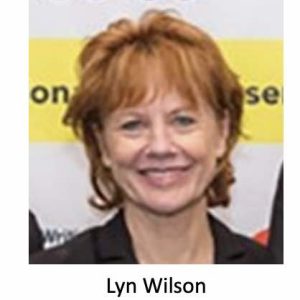 Lyn Wilson is a Team Leader Literacy in TAFE NSW Sydney Region, and designs foundation skills programs that meet community needs, industry and workplace needs, as well as the core LLND needs.She has also had a major focus on supporting Aboriginal student outcomes through customised pre-employment programs and with others from TAFE NSW, worked on the design and development of courses that allow Literacy learners the opportunity to focus on individual learning goals and customised learning plans. Lyn is also current chair of the Reading Writing Hotline Steering Group.
Lyn Wilson is a Team Leader Literacy in TAFE NSW Sydney Region, and designs foundation skills programs that meet community needs, industry and workplace needs, as well as the core LLND needs.She has also had a major focus on supporting Aboriginal student outcomes through customised pre-employment programs and with others from TAFE NSW, worked on the design and development of courses that allow Literacy learners the opportunity to focus on individual learning goals and customised learning plans. Lyn is also current chair of the Reading Writing Hotline Steering Group.
 Gemma Beall, Team Leader Literacy, TAFE NSW Sydney Region and works to update and expand vocational learner support and pathways programs, to create and contextualise courses with a student-centric approach and develop L&N programs for employees in individual and workplace contexts.Gemma is currently the VP of the NSW ALNC, a NSW representative on the Reading Writing Hotline Steering Committee and is Chair in the Foundation Skills Teacher Engagement Network within TAFE NSW.
Gemma Beall, Team Leader Literacy, TAFE NSW Sydney Region and works to update and expand vocational learner support and pathways programs, to create and contextualise courses with a student-centric approach and develop L&N programs for employees in individual and workplace contexts.Gemma is currently the VP of the NSW ALNC, a NSW representative on the Reading Writing Hotline Steering Committee and is Chair in the Foundation Skills Teacher Engagement Network within TAFE NSW.
U1 English Tactics
Natalie Nawrocki and Abraham Dunovits, Djerriwarrh Community and Education Services
Room 1
English tactics is a play on the term tactics. A tactic is something carefully planned to achieve a specific end and in this instance the tactic is learning through tactile application. This workshop examines how tactile learning can be applied in an adult English class and how learners can enhance and consolidate their language learning. Learners are varied and learn through a variety of intelligences. One of the intelligences is kinaesthetic learning.
Participants will revise the advantages of applying kinaesthetic learning in their class and how to apply this. Participants will be introduced to body movements to help learn the alphabet. In addition, participants will use dough as a medium for learning. The dough will be distributed and used to manipulate and used for extending and consolidating vocabulary. Extended activities will also be available to participants to further enhance literacy and numeracy skills. This workshop is particularly useful to those who teach pre-literacy levels.
 Natalie Nawrocki has been working in adult education for over 20 years. She has taught across all levels in Adult EAL and literacy classes. Currently she is teaching at Djerriwarrh Community & Education Services teaching and assessing in the SEE program. She has been teaching a pre-literacy level class for the past 10 years.
Natalie Nawrocki has been working in adult education for over 20 years. She has taught across all levels in Adult EAL and literacy classes. Currently she is teaching at Djerriwarrh Community & Education Services teaching and assessing in the SEE program. She has been teaching a pre-literacy level class for the past 10 years.
Abraham Dunovits has been teaching for over 20 years in the public and private sector. He currently works as team leader, teacher/trainer and assessor in the SEE program at Djerriwarrh Community & Education Services. In November last year, he was named as a finalist for the Excellence in Language, Literacy and Numeracy Practice Award at the 2023 Australian Training Awards.
U2 Assisting Neuro Diverse students in a digital environment.
Christine O’Callaghan, Foundation Skills Trainer, Academy of Interactive Entertainment
Room 2
How do you use the Foundation Skills Training package to deliver creative, responsive programs? In 2020 the Academy of Interactive Entertainment in Canberra received Commonwealth Government funding to develop and present the Foundation Skills Training Package. Christine has since assisted students to complete courses in Game Art, Game Design, Programming and Visual Effects and Programming (movie making). She has also supported trainers as they develop resources, and is assisting trainers and students to address the challenges presented by neuro diverse students in the learning environment. This presentation will address the challenges and achievements experienced when addressing LLN needs in this intensely digital arena.
 Christine O’Callaghan has been a Literacy/Numeracy Practitioner since 1981, when she first became a full time teacher at the Canberra Institute of Technology. Leaving the CIT in 2020, she took up a new position with the Academy of Interactive Entertainment, where she currently holds the position of Foundation Skills Trainer. Christine was the ACT representative on ACAL for many years, and is currently the Public Officer for ACAL.
Christine O’Callaghan has been a Literacy/Numeracy Practitioner since 1981, when she first became a full time teacher at the Canberra Institute of Technology. Leaving the CIT in 2020, she took up a new position with the Academy of Interactive Entertainment, where she currently holds the position of Foundation Skills Trainer. Christine was the ACT representative on ACAL for many years, and is currently the Public Officer for ACAL.
U3 Tutor Tip Sheets for library adult literacy tutoring
Iona Johnson, Senior Literacy Advisor, Libraries Tasmania
Room 3
The Libraries Tasmania Adult Literacy Service has run since 2011, offering individually tailored literacy support to adults wanting to build their literacy and numeracy skills. The service is the delivery arm of the 26TEN strategy in Tasmania, which aims to address the lower than national average adult literacy rates in the state. During this time, the service has looked for evidence-based approaches for tutoring and built an understanding of effective tutoring practices. One of the challenges has been ensuring that the volunteer tutors in the service adopt these approaches and so the professional learning program has been important. A recent initiative to support professional learning has been the development of a series of tutor tip videos and tutor tip sheets.
This session will provide some insight into the research that has informed the development of these approaches in the Adult Literacy Service. The presentation will outline the frameworks and concepts that underpin this work. Implications for practice will be discussed and tutor tip sheets will be available for participants to take away.
Iona Johnson is the Senior Literacy Advisor for Libraries Tasmania’s Adult Literacy Service. She previously worked as an adult Literacy Co-ordinator in Risdon Prison and her qualifications and experience in both education and community services, have informed her approach to adult literacy engagement. Focussing on approaches based on the science of reading when tutoring adults, she has worked with learners to build their literacy skills, enabling them to reach their learning goals.

